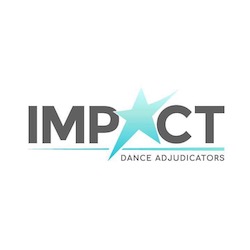Dance competitions often get a bad rap. You either love them or you hate them. Fans will tell you that dance competitions offer performance and scholarship opportunities, encourage dancers’ growth and continued training, and foster a sense of community within the industry. Opponents will argue that dance competitions are incredibly expensive, incite rivalry and rank dancers in an art form that should foster creativity and individuality.
Impact Dance Adjudicators (IDA) is a relatively young organization that has made great strides to literally impact the dance competition scene in a positive way. Founded by Courtney Ortiz, a professional dancer and former competition kid, IDA employs and provides qualified, passionate judges for competitions around the country.

Courtney Ortiz. Photo by LTSHOTS Photography.
Dance Informa got to chat with Ortiz about her company and outlook on the dance competition scene.
Did you grow up a competition kid?
“Yes, I did! I started competing at age eight, and finished at age 16. My studio was definitely considered a competition studio growing up in Maryland. We were huge and brought amazing versatility to the competition stage. We typically competed in about three regional events and one ‘nationals’ every season.”
Why do you think competitions are valuable?
“Competitions taught me so much to prepare me for the real dance world. I would say the biggest thing they prepped me for was learning how to work as a team. In the dance industry, you will very rarely (if ever) work as a soloist. Every single job you do will be alongside a group of dancers, whether if it’s in an ensemble of a musical, as a backup dancer or in a movie. Our job as dancers is to work together cohesively, and that is exactly what you have to do in group routines with your teammates at your studio. Competitions also taught me how to pick up and retain choreography quickly and to pay close attention to details, which are key factors to getting work as a professional.”
When did you become a competition judge?
“I got very lucky breaking into the judging industry. I was 21, and a friend in NYC thought of me when she had to back out of a scheduled judging event since I recently just worked with her on a project. She asked if I was interested, and I of course said, ‘Yes!’ since I grew up competing and would love to be on the other side of the table. So, I jumped in, judged my first competition and loved every second of it. I also made a great connection with the owners of the competition (who I still work for regularly to this day). Networking is huge in this industry; you never know what it will lead you to.”
What does that being a competition judge require?
“It’s extremely important that every judge has experience and advanced knowledge in all styles of dance, since you will be expected to judge everything under the sun at a competition. Ideally, competitions prefer that you are active in the dance world and are either a current/retired professional dancer or a full-time studio teacher. All judges must have experience teaching all ages and an understanding of how to judge multiple levels. You also should be able to provide solid feedback on your critiques and understand how to score appropriate to each age and level dancer.”
What inspired you to found IDA?
“Once I broke into the judging industry, I had the experience on my resume and that led me to more and more judging opportunities with different competition companies. Many of those companies trusted me for my recommendations on new judges for their panels and would always come to me asking me for referrals when they had a judge cancel last minute. I started thinking that there needed to be a better way for competitions to find quality judges. I’ve sat alongside my fair share of sub-par judges throughout my years who barley spoke on the critique tape, so I knew I needed to make a change in the industry!
My company, Impact Dance Adjudicators, personally pre-screens each judge who joins our roster to make sure they meet the standards and expectations to be a dance competition judge. My goal was to create an easy solution for competitions to find a professional level judging panel, save them time and money by supplying judges based in different regions across the country, and provide more judging opportunities to talented dance adjudicators.
And how does IDA work?
IDA was founded in 2014. We are going into our 5th season and currently work with numerous competition events across the country to supply our judges. Our growing roster of 100+ adjudicators range from newbies to veterans, from East Coast to West Coast! We help our judges find more judging opportunities to fill their schedules during the competition season and provide an easy staffing solution for competitions. We also offer an additional service— Online Judges Critiques—where dancers/teachers can send us a video from rehearsal or performance and we will critique it directly online. It’s an awesome new addition to the company that allows us to provide our knowledge to dancers from anywhere in the world, all done over the internet! My goal down the road with IDA is to be the top name in dance adjudicators—where dance teachers and studios know that if there are IDA judges on a competition’s panel, they will be receiving the best critiques!
What are the benefits of using IDA for competitions?
 The company was designed to be a convenient, easy solution to staffing judging panels for competitions. Competition companies have so many working parts to their events that finding a qualified judging panel should be the last thing they need to worry about. That’s where IDA comes in! Since we personally pre-screen all of our judges, that saves the competitions from having to screen and interview applicants on their own. Competitions also have the advantage of requesting judges based in specific regions and locations that cater to their event schedule, which helps reduce the cost of travel and accommodations. Finally, using IDA is a great safety net for competitions because they now have access to unlimited judges on our roster to use during their season. If one of the judges has to cancel on a scheduled event, we will have it covered by supplying a replacement judge.
The company was designed to be a convenient, easy solution to staffing judging panels for competitions. Competition companies have so many working parts to their events that finding a qualified judging panel should be the last thing they need to worry about. That’s where IDA comes in! Since we personally pre-screen all of our judges, that saves the competitions from having to screen and interview applicants on their own. Competitions also have the advantage of requesting judges based in specific regions and locations that cater to their event schedule, which helps reduce the cost of travel and accommodations. Finally, using IDA is a great safety net for competitions because they now have access to unlimited judges on our roster to use during their season. If one of the judges has to cancel on a scheduled event, we will have it covered by supplying a replacement judge.
What are the benefits becoming an IDA judge?
As a dance competition judge, hunting for your own jobs is very time consuming. The only way to find work as a judge is to send mass e-mail submissions to competitions or to get referred by a friend. Through IDA, judges now have a way to find more opportunities with competitions to fill in their schedule. Judges love the convenience of just sitting back and letting the jobs roll in. We also provide some benefits when working through IDA like overtime pay and negotiated rates/accommodations, etc. Every competition company pays different rates for their judges, but those hours each day are extremely long, so we guarantee our judges will receive additional compensation after a certain number of hours at the judging table. Finally, since many of our judges are current working professionals, there may be times a judge has to back out of an event, and it’s extremely helpful to know that if given the proper notice, IDA will easily just find a replacement judge for the position.
Competitions sometimes get a bad rap. How do you wish to change that?
The competition industry is BOOMING right now. There are dozens of new competitions and conventions opening their doors every single year. Competitions and conventions give dancers the opportunity to grow and learn as artists and expose them to exciting new possibilities. Competitions help provide a training ground for dancers to learn and improve based on their critiques. They also provide an outlet for dancers to watch and be inspired by other studios.
Howver, there is one thing I would love to see changed. I do feel that competitions seem to be catering to the “everyone’s a winner” mentality and, unfortunately, that isn’t preparing anyone for the real world. Competition should be exactly that—a competition. Not everyone is going to win, and it’s okay if you don’t! Rejection is a real thing we face regularly in the dance industry and even in the real world. Dancers should use that as motivation to train harder and continue to strive to be the best they can be. Winning isn’t going to make or break you in life. Passion and drive will get you further then the 1st place trophy ever will. Let competitions act as an exciting part in your training, as motivation, and as a chance to share your passion on stage with an audience.
To learn more about IDA, hire judges for your competition, or apply to become a judge, visit www.impactdanceadjudicators.com.
By Mary Callahan of Dance Informa.















